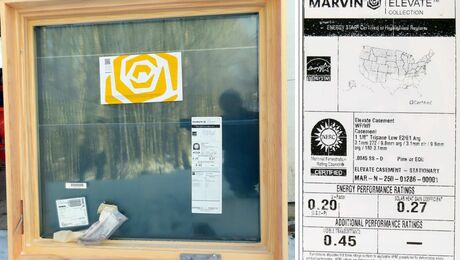Basement slab healthy flooring options
I’ve read the articles on GBA re flooring concerns on finished basement slabs due to moisture issues, i.e., moldy carpet, tile/laminate adhesives breaking loose, etc. The floor sub-contractor acknowledges a potential problem in our area but believes my situation has no cause for concern. I’m looking for a second opinion from the knowledgeable folks here.
On the cold edge of Zone 4. New construction. Walkout basement walls are half concrete/half framing. Concrete walls received waterproof upgrade over damp-proofing. There is an upgraded, heavy-duty 15-mil vapor barrier under the slab. The lower level has its own HVAC with higher-end Carrier humidity control. Not a separate de-humidifier, but supposedly fancy programming & upgraded hardware to control humidity. Carrier says of the Performance 17 Model 24ACB7, 2-stage AC, “Compressor enhanced summer dehumidification when managed by Performance Edge relative humidity performance thermostat (will use Carrier Cor Wi-fi).” It is combined with a DC VSM furnace. I also have a PV system that will cover most of my electrical power needs so not too worried about running the AC for dehumidification.
The floor contractor believes there are no worries about moisture/condensation affecting the two options we are considering–carpet & floating laminate planks. He says the problems around here are from some combination of no waterproofing on walls, no vapor barrier under slab and minimal AC in a full concrete basement.
My missing ingredient is no foamboard under the slab or on the concrete part of the walls (the framed parts have R-25 BIBS). A relatively small part of the concrete wall areas have R-13 batts set in 2x4s but spaced 2 inches away from concrete walls. The foamboard was just too expensive to install. I realize that potentially leaves me vulnerable to condensation.
Should I have any flooring concerns? What would you recommend? Carpet is the least expensive. The interlocking laminates are double the price but I would do it if that would be a better long-term solution. Some of the laminate planks are claimed to be 100% waterproof and need no adhesives. Some we’re looking at have cork bottom layers. If we use carpet, then could do tile in two bathrooms. If we use laminate throughout, then I would only need carpet in the dedicated home theater. Thanks.
GBA Detail Library
A collection of one thousand construction details organized by climate and house part









Replies
HI Bruce -
Just making sure you read this blog: https://www.greenbuildingadvisor.com/article/carpet-in-basements-the-issues-solutions-and-alternatives - I would strongly recommend rug(s) and not carpet.
Also, this blog on measuring moisture in slabs is a good resource and way to really know the moisture content of your basement slab: https://www.greenbuildingadvisor.com/article/extending-the-reach-of-a-moisture-meter.
Best - Peter
Carpeting or rugs will work fine if you keep the humidity low (around 55% works for me). In mild periods where the AC doesn't run, this will probably require a dehumidifier. Rugs are much better if you ever have a water problem.
Perhaps someone can comment on whether air and/or vapor impermeable pads are better (mine is permeable to both).
Peter, thanks for the blog. I did go for the easy analysis, I put the plastic down for a few days. Seems perfectly dry. Some of the tape didn't hold down tight on the concrete but most did, is that OK or does it need to be really airtight? Probably about a 15" x 21" piece.
Also, the slab was poured almost five months ago and of course humidity is lower in the winter here. Surface dirt is muddy due to recent rains. How would these factors affect the analysis of the apparently dry slab? Thanks.